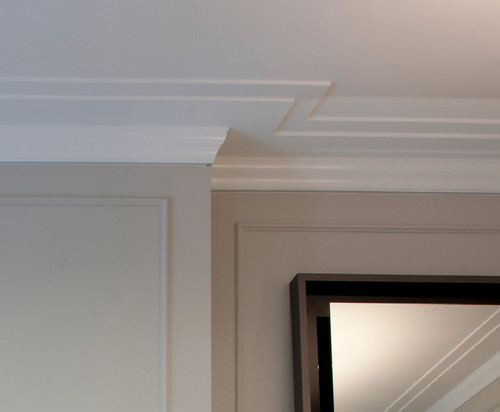Crown modeling creates a perfect transition between wall and ceiling and adds charm and value to a home.

Photo by dSPACE Studio Ltd, AIA – Discover home design design inspiration
Crown molding is typically used in a couple different situations:
1| At the tops of the kitchen cabinetry.
2| At the top of walls where a wall meets the ceiling.
In fact, both applications add character and do a good job of dressing up a room. Installing it is a project any do-it-yourself with some information can undertake because crown molding is not as difficult as it seems.
However, overhead work is tiring so do as much as possible at ground level. Safety is important and that’s why adequate time is required to set up your workstation. Make sure the saw is securely placed on a stand or on the ground with extensions or support blocks to hold longer pieces, if necessary. Wear safety glasses and always keep your fingers clear of the blade.
Tools: miter saw with crown stops; angle finder (or miter box); hammer; shims; safety goggles; glue; sand paper; wood filler; latex caulking; pencil.
1. If your ceiling is stippled, remove the texture spray so the molding will fit clearly. Use a putty knife and a spray water bottle to knock off unpainted stipple. Painted stipple requires a hooked paint scraper and more effort.
2. Mark the table to show the size of the molding. Mark the molding on the table drawing a pencil line along each edge of the molding. This will help you to hold the molding on the saw when you start cutting.
3. Make guide marks on the wall. Cut a piece of molding and put this piece against the ceiling, and draw a line along the bottom of the molding. Go around the room making similar marks at every few feet. However, inconsistencies in the framing and drywall mean neither ceiling nor wall will be perfectly straight. You’ll see a series of tick marks that seemingly wander up and down around the room. When installing the molding, you will know it’s at the correct spring angle when, on balance, the number of tick marks still exposed on the ceiling matches the number still visible on the wall.
4. Measure each wall from corner to corner and mark the length on the wall. Then find the studs and mark their locations using a stud finder. Mark the center of each on the wall.
5. Cut and install the molding. Cut the first piece of molding to the length you wrote on the wall. Have someone help you put it in place. If the fit is tight, flex the molding slightly to get it in place, than push it against the wall for a tight fit. Then nail the molding to the wall. To stay flat, crown molding must be nailed along both the top and bottom edges. Align the molding with the witness marks, and nail it in place.
6. By using a miter gauge or an angle finder you can determine the angle of the corner in question and, ultimately, the cutting angle for the saw. Since corners are seldom 90 degree angles, it is imperative that an accurate angle for the corner is obtained. Achieving perfect results for the more numerous inside corners is the bigger problem. The advent of the power miter saw has led to the practice of mitering both outside and inside corners. But mitering both ends of a length of crown molding requires an unachievable precision level in both measuring and cutting. For inside corners there are two ways to get through the corner:
- One way is to run the first piece into the wall or corner flat and even just as if the crown molding would end right there. Then use the coping method to take off from the corner. The act of nailing crown molding to the wall tends to open up inside miter joints, as will any later stud shrinkage. The traditional cope joint should always be used for inside corners. This is a neat looking corner and provided you took your time and made a nice cope it will flow through the corner as if there wasn’t a joint.
- The other way is to cut the inside angle on both pieces and to butt them together at the joint. There is nothing wrong with this type of joint and if you find its easiest then use this method and keep the miter tight at the joint. The trick here is to use the trial and error method. Cut yourself two short pieces of crown and let’s say it’s a 90 degree inside corner, try cutting two 45 degree inside angles too these short pieces and trial fit to see how they butt together at the joint. Adjust the angle on the saw as necessary and keep trial fitting until the correct angle is set to achieve a tight miter with these short pieces. Then when you are confident the angle is correct cut the actual pieces of crown that will be installed.
Modern Home Interiors with An Amazing Decor (howtobuildahouseblog.com)
7. In fact, there are four types of cuts:
a) Inside corner: Left and Right pieces.
b) Outside corner: Left and Right pieces.
8. Nail the molding in place and prepare for painting. Sand any splices smooth with 120-grit sandpaper. Run a bead of caulk along the top and bottom edges of the of the molding, and smooth it out with your finger. Fill the nail holes with window glazing, let it dry, and sand smooth.
It’s better to have someone helping for a project like this. Installing crown molding is like any other thing, the more you do the better you get.


